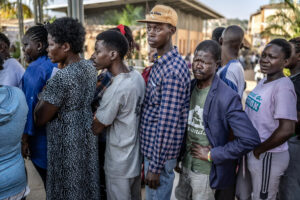Two weeks ago, every hallway and corner of the Taipei International Convention Center buzzed with digital rights advocates strategizing, innovating, and forging solutions. In a global moment of unprecedented uncertainty, RightsCon provided a platform for advocates to roadmap a plan of action as powerful as the challenges ahead.
During the last week of February, digital democracy experts from every corner of the world gathered in Taiwan for RightsCon — an annual convening that gathers human rights defenders, policymakers, activists, journalists, lawyers, academics, and technologists to jointly develop responses to the acute issues at the intersection of human rights and technology. As Access Now Executive Director Alejandro Mayoral pointedly underlined, these issues are far-reaching and impact every aspect of society: “unchecked social media companies, AI innovation at all costs, ineffective and inconsistent regulation, deterioration of multi-stakeholder spaces, tech use to surveil, censor and chill.”
Urgency gripped every session. Following the Trump administration’s slashing of 83% of USAID programs, many organizational leaders warned they were on life support. From digital helplines being shut down to disappearing emergency response funds that protect vulnerable defenders, many advocates emphasized that their organizations might soon cease to exist. The concerns shared were not only material, but were also rooted in increasingly hostile attitudes toward human rights stemming from authoritarian leaders and governments.
For example, in a session co-hosted by RFK Human Rights, experts shared how public officials are increasingly using technology to restrict civic space, hindering the work of rights defenders, activists, and journalists. The discussion focused on Latin America and the pattern of authoritarian leaders blocking, harassing, and censoring human rights advocates and journalists. Sofía Jaramillo, Senior Staff Attorney for Civic Space emphasized “When public officials use social media to demonize dissent and the brave work of journalists and spread disinformation, a functioning civic space is undermined. Accountability demands both strategic litigation at international and regional mechanisms like the Inter-American Human Rights system as well as the mobilization of civil society to enforce digital rights protections.”
Along with mapping out the breadth of obstacles, participants discussed visions for the future, emphasizing areas of opportunity amidst sobering struggle. In referencing the potential to create a global network of journalists at risk for covering war crimes, Sevgil Musaieva, Editor-in-Chief at Ukrainska Pravda, highlighted: “It’s very important in the future to build these bridges and to fight for common values together.”
In trying to achieve this objective, stakeholders at the convening looked to one another to build strategic and impactful coalitions that could mobilize in new ways. The magic of RightsCon came through the ability to identify problems, devise solutions, and set them into motion all in one place. In a session entitled “The New American Reality: Resistance and Power in the Face of Trump’s Destruction,” David Kaye, Justin Hendrix, and Cindy Cohn led attendees through a conversation about the complexities of the hurdles facing the human rights movement.
Following their remarks, the floor opened to a diverse group of attendees, ranging from the Executive Director of Article 19 to youth organizers championing Indigenous rights. At one point, I raised my hand and offered my own reflections — I urged those in attendance to actively include young people in their organizing, given that our generation, having grown up in the digital world, is uniquely positioned as both innovative responders and prime targets for doxxing, censorship, and digital harassment due to our activism on our campuses and in our communities. Ideas shared on how to meet the moment spanned far and wide, from building human rights organizing resources for workers at tech companies to amplifying the work of global South activists who have long been leading the movement for human rights. As the session concluded, groups huddled to share Signal information, begin email chains with colleagues, and set aside time for dedicated meetings that could begin transforming dialogue to action.
In this spirit of collective action, the RFK Human Rights team showcased its efforts to support civic space advocates. At RightsCon, Sofía Jaramillo also presented a tech demo of the Civic Space Case-Tracker, a tool designed to map and monitor judicial cases related to freedom of expression, association, and assembly across the globe. This presentation exemplified how digital tools can be harnessed not just to threaten but also to protect those on the frontline. The Case-Tracker mobilizes a wide variety of support to positively impact case outcomes. Much like the collaborations emerging from the convening, the Case-Tracker strengthens global solidarity by connecting litigants with crucial resources, whether through assisting with legal strategy, connections to funding sources, psychological support, and international coalitions, or engaging partners in global advocacy campaigns.
RightsCon imbued attendees with both a sobering understanding of the dire threats to digital democracy and also a profound feeling that resilience and collaboration will allow us to drive meaningful resistance. From hallway conversations that allowed partners to start aligning their priorities to post-session chats that laid the groundwork for organizational partnerships, the convening was a meeting ground to build and sustain movement. As the varying sessions illustrated, digital rights advocates are under no illusions about the enormity of the challenges ahead. Yet, RightsCon demonstrated that in the face of growing repression, the movement for human rights will only sharpen its resolve.



